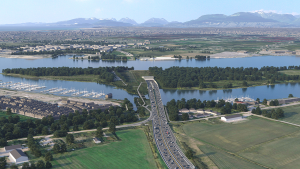Builders in northern B.C. are sounding the alarm on procurement practices they believe are a departure from industry standards of transparency and fairness.
The issue arose from a request for proposals (RFP) that was issued from the Ministry of Forests, Lands and Natural Resource Operations for the Vanderhoof Fire Zone Hangar Redevelopment. After teams were formed and proposals were sent, the RFP was cancelled without explanation.
“Was it that the proposals were over budget? Were the proponents not qualified? What was the reason? That is generally acceptable information for industry to request a public owner,” said Scott Bone, CEO of the Northern Regional Construction Association (NRCA).
He noted the design-build RFP required a significant investment of time and money from proponents to put together teams of trades, design experts, engineers and architects. The same RFP was then reissued with minor revisions that the association believes could have been easily negotiated with the successful proponent, a standard practice for procurement.
“To put all that together, submit it and not get any information or rationale is a significant concern for me,” he said.
The association was so concerned that it sent a letter to the ministry looking for answers and pointing out that its process did not follow industry best practices for fairness and transparency. Bone said he is especially aware of public procurement processes as he was deeply involved in procurement for the City of Prince George for more than 30 years.
“I know the other side of it. The Ministry of Forests has an obligation to fair, open and transparent procurement methods,” said Bone. “There has been no co-operation or engagement from the ministry.”
While Bone said he understands some of the specifics of the process are sensitive, including who the successful proponents were, he wants to know why the original RFP was cancelled, if the winning proposal met the RFP requirements and if it was in budget.
Bone said without transparency, the integrity of the process can’t be verified.
The Journal of Commerce reached out to the Ministry of Forests for comment, but did not receive a response as of deadline.
Despite the issue, Bone hopes it can be an opportunity to improve procurement practices and collaboration with the province.
“There is regularly positive collaboration on key issues,” said Bone. “Fair public procurement practices is another one of those. This particular instance is driving our desire to engage government in a more fulsome discussion about how we can provide awareness and training so these situations don’t occur again.”
Chris Atchison, president of the BC Construction Association said he is working with the NRCA and government officials to try and resolve the issue but noted it is part of a larger trend.
“Sadly blatantly poor procurement practices have become more common,” said Atchison. “The degree in this case is extreme but our members are facing these challenges routinely.”
Atchison said the procurement sector has seen its share of “brain drain” as many experts are retiring and buyers of construction services are failing to understand how poor procurement practices can impact businesses and the workers they support.
“They believe they are managing their risk, but they are just creating more of it,” he said.
Atchison said the associations are committed to working with government but want to see an effort to address the issues that have been raised.
“Why is fair and open procurement important? It’s because this is livelihoods, this is someone’s business, they have employees, they have invested in teams and it’s on the line. It’s the right thing to do and government projects should and must be available to the widest cohort of businesses.”
Follow the author on Twitter @RussellReports.











Recent Comments
comments for this post are closed